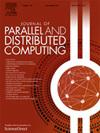A zero-knowledge proof federated learning on DLT for healthcare data
IF 3.4
3区 计算机科学
Q1 COMPUTER SCIENCE, THEORY & METHODS
引用次数: 0
Abstract
With the increasingly widespread adoption of Healthcare 4.0 practices, new challenges have arisen for the utilization of collected sensitive data. On the one hand, these data have immense potential to unlock valuable insights for personalized medicine, early disease detection, and predictive analysis thanks to the use of Artificial Intelligence. On the other hand, ensuring the protection of patient privacy is of paramount importance to maintain trust and uphold ethical practices within the healthcare system. Classical centralized learning approaches do not fit well with the privacy and security requirements imposed by the law and the sensitivity of treated data, which is why decentralized learning approaches are gaining ground. Among these, Federated Learning (FL) stands out as a viable alternative, providing greater security and performance comparable to classic centralized learning approaches. However, there are still various attacks targeting the local parameters or gradients updated by the participants. Therefore, we present our architecture based on the conjunction of Zero-Knowledge Proof, FL, and blockchain that implements also the decentralized identifier standard. The adoption of this architecture can grant the execution, management, supervision, and updating of the FL process, guaranteeing the resilience of the system and the reliability and traceability of exchanged data. In order to test the performance, robustness, and implementation costs of the proposed architecture, we develop a case study on the prediction of blood glucose levels in people with Type-1-diabetes. The results of our analysis show an improved system in terms of balance between performance privacy and security, guaranteeing high levels of verifiability, therefore proving the proposed architecture suitable for most of the FL processes needed in the healthcare field.
针对医疗保健数据的零知识证明联合学习 DLT
随着医疗保健 4.0 的应用越来越广泛,如何利用收集到的敏感数据也面临着新的挑战。一方面,由于人工智能的使用,这些数据具有巨大的潜力,可以为个性化医疗、早期疾病检测和预测分析提供有价值的见解。另一方面,确保保护患者隐私对于维护医疗系统内的信任和道德规范至关重要。传统的集中式学习方法与法律规定的隐私和安全要求以及治疗数据的敏感性不相适应,因此分散式学习方法逐渐受到重视。其中,联邦学习(FL)作为一种可行的替代方法脱颖而出,它提供了更高的安全性,其性能可与传统的集中式学习方法相媲美。然而,针对参与者更新的本地参数或梯度的攻击仍层出不穷。因此,我们提出了基于零知识证明(Zero-Knowledge Proof)、FL 和区块链(blockchain)的架构,该架构还实现了去中心化标识符标准。采用这种架构可以执行、管理、监督和更新 FL 流程,保证系统的弹性以及交换数据的可靠性和可追溯性。为了测试拟议架构的性能、稳健性和实施成本,我们开发了一个预测 1 型糖尿病患者血糖水平的案例研究。我们的分析结果表明,该系统在性能、隐私和安全性之间的平衡方面有所改进,保证了高水平的可验证性,因此证明了所提出的架构适用于医疗保健领域所需的大多数 FL 流程。
本文章由计算机程序翻译,如有差异,请以英文原文为准。
求助全文
约1分钟内获得全文
求助全文
来源期刊

Journal of Parallel and Distributed Computing
工程技术-计算机:理论方法
CiteScore
10.30
自引率
2.60%
发文量
172
审稿时长
12 months
期刊介绍:
This international journal is directed to researchers, engineers, educators, managers, programmers, and users of computers who have particular interests in parallel processing and/or distributed computing.
The Journal of Parallel and Distributed Computing publishes original research papers and timely review articles on the theory, design, evaluation, and use of parallel and/or distributed computing systems. The journal also features special issues on these topics; again covering the full range from the design to the use of our targeted systems.
 求助内容:
求助内容: 应助结果提醒方式:
应助结果提醒方式:


